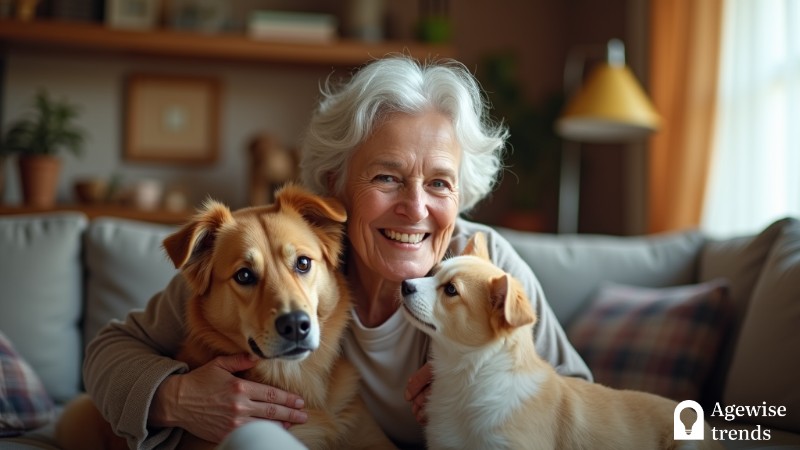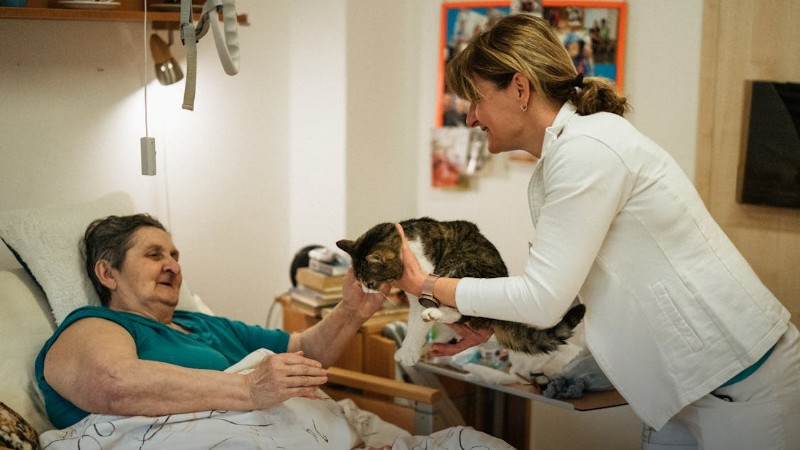For many seniors, pets are much more than companions—they are family, confidants, and sources of joy in life’s later years. The bond between seniors and their pets can bring a sense of purpose, alleviate loneliness, and offer emotional and physical benefits.
However, as aging brings new challenges, maintaining this bond can become increasingly difficult. Understanding and addressing the unique needs of seniors and their pets is vital to ensuring they continue to thrive together.
Key Takeaways
Pets play a vital role in enhancing the quality of life for seniors by providing companionship, emotional support, and physical benefits.
- Pets can alleviate loneliness and stress in seniors, promoting overall well-being and happiness.
- Caring for pets requires creative approaches that address the unique challenges of aging, including financial constraints, social isolation, and physical limitations.
- Support systems such as pet-friendly housing, volunteer networks, and education programs are essential to ensuring seniors can continue to care for their pets and maintain a strong bond.
Furry friends fill hearts with joy and wellness
For seniors, the bond with a pet is often a profound and life-enhancing connection. Pets provide companionship that can be especially meaningful for older adults who live alone or have limited social interactions. The presence of a dog wagging its tail or a cat curling up on a lap offers comfort that words often cannot.
Research shows that spending time with pets reduces stress and anxiety, lowers blood pressure, and can even improve heart health. Beyond emotional benefits, pets encourage physical activity. Walking a dog, playing with a cat, or grooming a furry companion helps seniors maintain mobility and stay active, which is vital for overall health.
Pets also serve as social connectors. Walking a dog in the park or attending pet-related events often leads to conversations and friendships that might not have happened otherwise. For many seniors, these interactions are a critical part of maintaining a sense of community and belonging.
For those navigating grief or loss, pets can offer healing and resilience. The routine of caring for an animal creates purpose, while their unconditional affection eases the weight of emotional pain. Seniors who lose a spouse, partner, or friend often find solace in the consistent companionship of their pets.
Even the simple act of petting an animal can trigger the release of oxytocin, a hormone that promotes feelings of well-being. This biological response underscores the importance of pets as not just companions but also as sources of therapeutic value.
Overcoming the hurdles of pet care for seniors
Despite the joy pets bring, caring for them can sometimes feel overwhelming for seniors. Physical limitations, financial constraints, and social isolation can all complicate the responsibilities of pet ownership.
As seniors age, they may experience reduced mobility or strength, making everyday tasks like walking a dog or cleaning a litter box more challenging. Chronic health conditions can further limit their ability to keep up with their pets’ needs. These limitations can lead to feelings of guilt or frustration when seniors feel they cannot provide the level of care their pets deserve.
Financial constraints are another critical issue. Many seniors live on fixed incomes, which can make it difficult to afford pet food, grooming, or veterinary care. Emergency medical costs for pets can be especially daunting. These expenses often force seniors to make difficult decisions about their pets’ care or well-being.
Social isolation exacerbates these challenges. Seniors who lack family or friends nearby may struggle to find someone to help with tasks like taking a pet to the vet or picking up supplies. For those living in retirement communities or apartments, housing restrictions may limit the ability to own pets or impose rules that make ownership difficult.
Weather can also become a barrier for seniors, particularly those with dogs. Walking pets during extreme heat, cold, or rain is physically taxing and, in some cases, dangerous. This can lead to a sedentary lifestyle for both the senior and their pet, diminishing the health benefits they would otherwise enjoy.
Developing care networks for seniors and pets
Support systems for seniors and their pets are evolving, providing solutions to help older adults manage the challenges of pet care. Communities, organizations, and innovative services are stepping in to bridge the gap and make pet ownership more accessible.
Many local organizations now offer programs specifically designed to assist seniors with pets. These may include pet food delivery services, subsidized veterinary care, or transportation assistance for vet appointments. Nonprofits often step in to provide financial aid or foster care for pets during times when seniors may need temporary support, such as hospital stays.
Volunteer networks are another valuable resource. Many communities have programs where volunteers help seniors with tasks like dog walking, grooming, or cleaning up after pets. These efforts not only alleviate the physical burden of pet care but also foster a sense of connection between seniors and their neighbors.
Innovative housing options are also playing a crucial role. Pet-friendly senior living communities are becoming more common, offering amenities like dog parks, pet grooming stations, and on-site veterinary services. These accommodations allow seniors to keep their pets close while receiving the support they need.
Faith-based or cultural organizations can also provide unique resources. For instance, some religious groups offer blessings for pets, fostering a spiritual connection that helps seniors feel supported in their roles as caregivers.
Nurturing lifelong bonds between seniors and pets
Maintaining the relationship between the elderly and their pets requires creative and compassionate approaches that address the unique challenges of aging. Financial assistance programs can make a significant difference, helping seniors cover veterinary costs or providing free pet food and supplies. Expanding these initiatives ensures that more seniors can access the resources they need to care for their pets.
Education also plays a crucial role. Workshops on pet health, nutrition, and behavior provide seniors with the knowledge and confidence to care for their pets effectively. This kind of education empowers seniors to navigate challenges and anticipate their pets’ needs.
Promoting pet therapy programs offers another meaningful solution. Therapy animals visit seniors in care facilities or at home, providing companionship and emotional support without the long-term responsibilities of ownership. These interactions bring many of the same benefits as pet ownership, including reduced stress and improved mood.
Community engagement is essential to sustaining the bond between the elderly and their pets. Local governments, nonprofits, and individuals all play a role in creating an environment where seniors and their pets can thrive. Whether through policy changes, volunteer efforts, or simply offering a helping hand, every action contributes to a more inclusive and supportive world for seniors and their furry companions.
Healthcare professionals can also play a role in supporting seniors with pets. Doctors, physical therapists, and social workers can include discussions about pet care in their patient evaluations, providing referrals to relevant resources when needed.
Strengthening senior-pet bonds
The relationship between seniors and their pets is one of mutual love, loyalty, and care. For many older adults, pets are more than companions—they are lifelines to emotional, physical, and social well-being. However, the challenges of aging can make pet care difficult, putting these invaluable relationships at risk.
By recognizing and addressing these challenges, we can ensure that seniors continue to experience the joy and benefits of pet ownership. Programs that offer financial aid, volunteer support, and pet-friendly housing are just a few of the ways communities can help. Education and therapy programs also provide innovative solutions to support seniors and their pets.
The unconditional love of a pet enriches lives, reduces loneliness, and brings daily happiness. With the right support systems, seniors and their pets can continue to share these moments of joy, strengthening their connection and improving their quality of life.
Pets and seniors share a unique and irreplaceable bond. By investing in solutions that make pet ownership more accessible, we not only support the well-being of older adults but also celebrate the enduring love and companionship that pets bring into their lives. Together, we can ensure that no senior has to face the challenges of pet care alone, preserving the happiness and fulfillment that pets bring to their twilight years.















